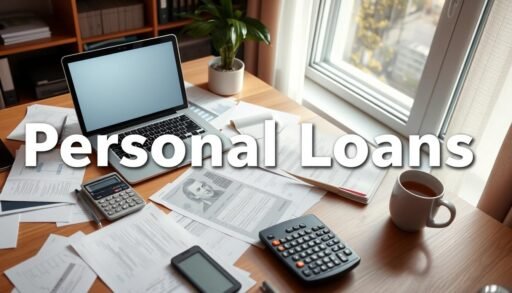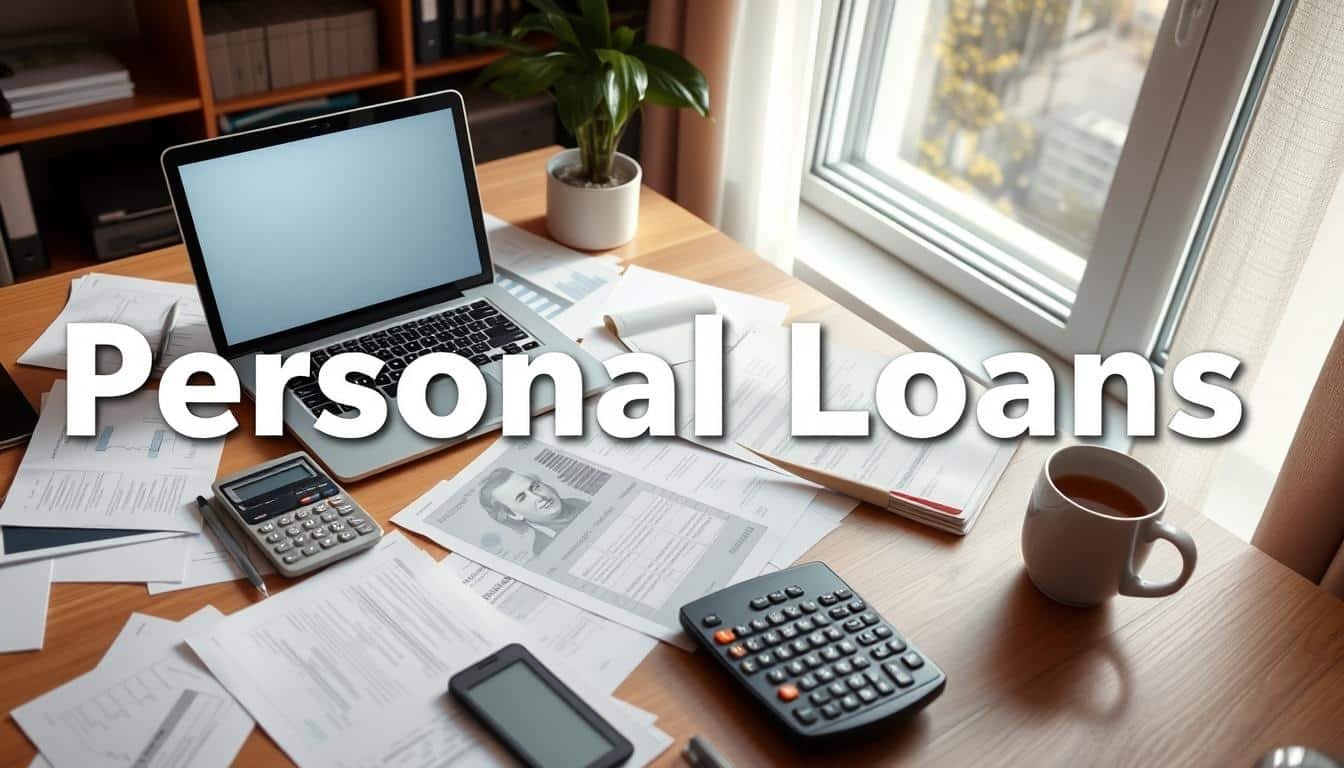Unsecured personal loans are a flexible funding option for many. They range from $1,000 to $100,000 and are based on your credit and income. Unlike secured loans, you don’t need to put up assets as collateral.
APRs on these loans are between 6% and 36%. If you have a strong credit score, you might get a lower rate. You can choose a repayment term from two to seven years, fitting it to your budget.
For example, federal credit unions keep APRs for unsecured loans at 18%. This rule doesn’t apply to short-term, small-dollar loans.
Key Takeaways
- Unsecured personal loans range from $1,000 to $100,000 and do not require collateral.
- APRs on unsecured personal loans typically range from 6% to 36%, with better rates for higher credit scores.
- Repayment terms can vary from two to seven years, allowing flexibility in loan structuring.
- Lenders evaluate creditworthiness, income stability, and debt-to-income ratio when approving applications.
- Unsecured personal loans can be used for various purposes, including debt consolidation and unexpected expenses.
Understanding Unsecured Personal Loans: Definition and Basics
Unsecured personal loans are a common way to borrow money without needing collateral. These installment loans come from banks, credit unions, or online lenders. They give you a sum of money to pay back over time with regular payments.
How Unsecured Personal Loans Work
To get an unsecured personal loan, you need to apply and pass a credit check. Lenders look at your credit history, income, and debt-to-income ratio to decide if you qualify and what interest rates you’ll get. If you’re approved, they give you the money. Then, you pay it back with fixed monthly payments for the term of the loan.
Key Features of Unsecured Loans
- Flexible loan amounts, usually from $1,000 to $50,000
- Loan terms are often between 2 to 7 years
- You can choose from fixed-rate and variable-rate options
- They don’t require collateral, making them easier to get than secured loans
Loan Amounts and Terms Available
Unsecured personal loans offer flexible loan amounts and terms. You can borrow from $1,000 to $50,000, with repayment times from 2 to 7 years. The exact amount and term you can get depends on the lender and your credit score.
“Unsecured personal loans provide a convenient and flexible financing option for individuals, without the need for collateral.”
Secured vs Unsecured Personal Loans: Key Differences

When looking at personal loans, you have two main choices: secured and unsecured loans. The big difference is whether collateral is needed. Secured loans ask you to use something valuable, like a car or home, as collateral. Unsecured loans don’t need any collateral.
Having collateral or not changes things for both the lender and you. Secured loans usually have lower interest rates and you can borrow more because the lender feels safer. This is because they can take your collateral if you can’t pay back the loan. Unsecured loans, however, have higher interest rates because the lender is taking a bigger risk without collateral.
| Loan Type | Interest Rates | Borrowing Limits | Collateral Required |
|---|---|---|---|
| Secured Loan | Lower | Higher | Yes |
| Unsecured Loan | Higher | Lower | No |
Secured loans might give you a better rate and more to borrow, but you risk losing your collateral if you can’t pay. Unsecured loans don’t risk your assets but might be harder to get, especially if your credit isn’t great.
Choosing between a secured or unsecured loan depends on your financial situation and credit score. If you have good credit and a steady income, unsecured loans might be better. But if you have lower credit or need to borrow a lot, a secured loan could be the way to go.
Qualifying for Unsecured Personal Loans

To get an unsecured personal loan, you need to meet certain criteria. Lenders look at your credit score, income, and debt-to-income ratio. These are key factors in their decision-making process.
Credit Score Requirements
Lenders want borrowers with a good credit history and a score of 700 or higher. If your score is lower (below 670), getting a loan might be harder. You might also get a higher interest rate. Boosting your credit score before applying can help you get better terms.
Income and Debt-to-Income Ratio
Lenders check your income and debt-to-income ratio too. They want to see if you can pay back the loan. A DTI ratio under 50% is best. This means you’re not spending too much on debt each month.
Having a stable job and steady income also helps. It shows lenders you’re reliable.
Application Process and Documentation
Applying for an unsecured personal loan means sharing financial details and getting a credit check. You’ll need to provide things like pay stubs and bank statements. Some lenders let you pre-qualify without hurting your credit score. This is called a “soft credit inquiry.”
After approval, the lender will do a “hard credit inquiry.” This might slightly lower your credit score.
Knowing what lenders look for can help you prepare. It lets you improve your chances of getting a good loan.
Where to Get Unsecured Personal Loans and Best Uses

Unsecured personal loans are easy to find from online lenders, credit unions, and banks. They offer a flexible way to borrow money without needing collateral.
Online Lenders: Online platforms like LightStream, SoFi, and Discover offer quick loans. They look for good to excellent credit, with scores from 660 to 700.
Credit Unions: Credit unions are great for those with fair or bad credit. They consider more than just credit scores. Their loans often have good rates and flexible terms.
Banks: Banks also offer unsecured personal loans. They might give more money and lower rates to loyal customers with strong credit.
These loans are good for many things, like debt consolidation, home improvements, or unexpected expenses. When choosing a lender, look at interest rates, fees, repayment terms, and how fast you can get the money.
It’s important to understand the loan terms and make sure you can pay it back. By comparing different options, you can find the best loan for your needs.
| Lender | Minimum Credit Score | Loan Amounts | Repayment Terms |
|---|---|---|---|
| LightStream | 660 | $5,000 to $100,000 | 2 to 7 years |
| SoFi | Undisclosed | $5,000 to $100,000 | 2 to 7 years |
| Discover | 660 | $2,500 to $40,000 | 3 to 7 years |
| Upstart | No minimum | $1,000 to $50,000 | 3, 5, or 7 years |
| Prosper | 560 | $2,000 to $50,000 | 2 to 5 years |
| Best Egg | 600 | $2,000 to $50,000 | 3 to 5 years |
| LendingClub | 600 | $1,000 to $40,000 | 2 to 6 years |
| Upgrade | 580 | $1,000 to $50,000 | 2 to 7 years |
| Reach | 660 | $3,500 to $40,000 | 2 to 5 years |
Unsecured personal loans are a powerful tool for many financial needs. Knowing what’s available helps borrowers make smart choices and use these loans wisely.
Also Read : What Are Commercial Loans And How Do They Work?
Conclusion
Unsecured personal loans are a flexible way to get money for different needs, without needing collateral. They are good when used wisely, letting people get funds fast and easily. Knowing the terms and comparing offers helps make the right choice for your financial goals.
These loans might have higher interest rates than secured ones. But, they don’t risk your personal assets. Think about your credit score, debt, and how you can pay back before applying for an unsecured loan. Paying on time is key to keep a good credit score and avoid problems.
For those looking for flexible loan options, unsecured personal loans are a good choice. By checking your finances and looking for the best fixed monthly payments, you can find a loan that fits your needs. Being careful with personal loan faqs and making timely payments can help you apply for an unsecured loan that suits your financial situation.
FAQs
Q: What is an unsecured personal loan?
A: An unsecured personal loan is a type of loan that does not require collateral, meaning you do not need to secure the loan with an asset like a house or car. Instead, the loan is issued based on your creditworthiness, income, and credit history.
Q: What are the typical interest rates for unsecured personal loans?
A: Interest rates for unsecured personal loans can vary widely based on factors such as your credit score and the lender. Generally, personal loan rates can range from around 5% to 36%, with lower rates typically available to those with good credit.
Q: Can I get an unsecured loan if I have bad credit?
A: Yes, there are unsecured loans for bad credit available, but they may come with higher interest rates. It’s important to shop around and compare loan options to find the best unsecured personal loans that fit your financial situation.
Q: What can I use an unsecured personal loan for?
A: Unsecured personal loans can be used for a variety of purposes, including debt consolidation, home improvements, medical expenses, or any other personal expenses. However, it’s important to use the loan proceeds responsibly.
Q: Do unsecured loans require collateral?
A: No, unsecured loans do not require collateral, which means you do not have to risk losing any assets if you fail to repay the loan. This is one of the main features that differentiate them from secured loans.
Q: How do I apply for an unsecured personal loan?
A: To apply for an unsecured personal loan, you typically need to fill out a loan application with your personal information, income details, and credit history. After submitting your application, the lender will review it and determine if you’re approved for a loan.
Q: What are the common loan terms for unsecured personal loans?
A: Common loan terms for unsecured personal loans range from 2 to 7 years, and the loan amount can vary based on the lender. It’s important to consider the loan term as it affects your monthly payments and the total interest paid over the life of the loan.
Q: How can I lower my interest rate on an unsecured personal loan?
A: To lower your interest rate on an unsecured personal loan, you can improve your credit score, shop around for the best unsecured loan options, and consider applying for a rate discount if the lender offers it. Additionally, offering a larger loan amount may help secure a lower interest rate.
Q: What should I consider before getting an unsecured personal loan?
A: Before getting an unsecured personal loan, consider your credit score, the total loan amount you need, the associated interest rates, fees, and the monthly payment you can afford. It’s also important to review the loan terms and conditions to ensure they align with your financial goals.
Source Links
- https://www.nerdwallet.com/article/loans/personal-loans/unsecured-personal-loans-no-collateral
- https://www.citi.com/personal-loans/learning-center/basics/unsecured-personal-loan
- https://lendedu.com/blog/how-do-personal-loans-work
- https://www.bankrate.com/loans/personal-loans/unsecured-loans-definition/
- https://www.investopedia.com/terms/u/unsecuredloan.asp
- https://www.bankrate.com/loans/personal-loans/secured-vs-unsecured-personal-loans/


